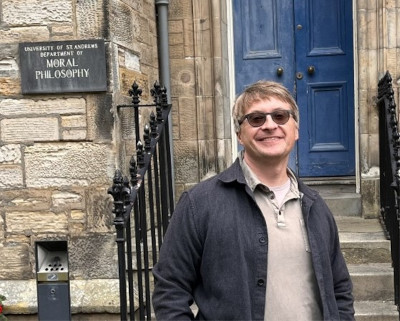Graduate School
University of Memphis Graduate SchoolCelebrating Faculty Excellence: Dr. Remy Debes - Receives 2024 GSA Mentor Award
 During Teacher Appreciation Week, it's a perfect time to honor the remarkable efforts
of educators who surpass expectations in aiding and advising their students. Dr. Remy Debes stands among the 8 distinguished recipients of the 2024 GSA Mentor Award. His commitment
to guiding graduate students at the University of Memphis within the Department of Philosophy, serving as both Professor of Philosophy and Chair, has merited him this esteemed
recognition.
During Teacher Appreciation Week, it's a perfect time to honor the remarkable efforts
of educators who surpass expectations in aiding and advising their students. Dr. Remy Debes stands among the 8 distinguished recipients of the 2024 GSA Mentor Award. His commitment
to guiding graduate students at the University of Memphis within the Department of Philosophy, serving as both Professor of Philosophy and Chair, has merited him this esteemed
recognition.
What strategies do you employ to support and guide your mentees in their academic and personal growth?
Mentoring sometimes requires so-called “tough love.” Sometimes Dr. Debes finds himself needing to be frank and call out his mentees when they fall short of what they are capable of. And not only on the intellectual side. In his experience, it can be harder for graduate students to get used to the “job” side of this career. So, sometimes he finds himself needing to school mentees on professional expectations. And this is usually uncomfortable.
That said, far more often Dr. Debes thinks that mentoring requires not tough love, but just love, by which he means genuine concern and care. Graduate school can be stressful, exhausting, and lonely. Students can feel like they are marooned on an island all by themselves. When that happens, they need to know that someone has their back. And Dr. Debes wants all his mentees to know that this “someone” is him.
So, in addition to the academic side of mentoring, Dr. Debes tries to watch out for his mentees in little ways. He looks for opportunities to take them out for coffee or pick up a lunch or dinner tab. He tries to send check-in emails during the term or invite them over to his porch to chat. His hope is that, should they find themselves in a corner, or feeling like they are on this journey alone, these little gestures of care will remind them that he is around, and make them feel comfortable turning to him for help. Dr. Debes doesn’t know if this approach works. But he also doesn’t know any other way to be.
What motivates you to dedicate your time and effort to mentoring graduate students?
According to Dr. Debes, no one makes it in academia all on his own. Grit, sacrifice, talent, and determination are, of course, crucial. But without someone to guide him in all this hard work and to recognize his talents (often before he does himself), most professors would not be where they are today. At any rate, Dr. Debes knows that he would not be where he is if he had not received such guidance. He has benefited from the wisdom, genius, and care of some truly remarkable mentors over the years, and especially during the graduate years. Charles Griswold, Stephen Darwall, Liz Anderson, David Velleman, Phoebe Ellsworth, Louis Loeb. These scholars and others like them played vital roles in his success. Indeed, Dr. Debes knows he never adequately express his gratitude to them. So, he tries to pay it forward instead, as best as he can. This is the biggest reasons that he takes mentoring seriously.
What does receiving the GSA Mentor Award mean to you?
Receiving the GSA Mentor Award came as a pleasant surprise to Dr. Debes. He was unaware of the nomination process and felt humbled by the recognition. Dr. Debes has always considered himself more attuned to working with undergraduate students, and his research interests often diverge from those of graduate students at Memphis. Despite this, his role as Chair of Philosophy afforded him the opportunity to engage directly with graduate students on a regular basis.
Recognizing his weakness in mentoring graduate students, Dr. Debes initiated "Chair Listening" meetings where he would meet individually with students to listen to their thoughts and concerns. These sessions proved invaluable as students shared their ideas and questions with enthusiasm and goodwill. While he couldn't always address every concern, Dr. Debes endeavored to provide support and empathy whenever possible.
Through these interactions, Dr. Debes began to feel a sense of mentorship towards all graduate students, not just those he directly mentored. This award may reflect that broader commitment to supporting and advocating for graduate students as a whole. Regardless, he is deeply honored to receive this recognition.
 What do you find most rewarding about being a mentor?
What do you find most rewarding about being a mentor?
Dr. Debes said this is the easiest question to answer: “the success of my students”.
He loves, loves, loves to celebrate the accomplishments of his students – and really
all the graduate students in our program. And they are so amazing, they give him opportunities
to do this all the time. Do you know that in four out of the five years he has been
Chair of Philosophy, one of our doctoral students has won the Graduate Student Meritorious
Teaching Award? That is a university-wide award, with often only two winners!
But our graduate instructors pour their hearts into teaching. They take the advice
of their teaching mentors very seriously. And they are endlessly striving to make
their classes not just successful, but memorable. He knows this because as Chair he
can read all their evaluations including all the qualitative feedback students give.
It is always overwhelming to him to learn how grateful and excited the undergraduates
are about the classes our graduate students teach. Indeed, it makes it very easy –
and very enjoyable – to recommend our graduates for these teaching awards.
He should also say this in response to this question: He is awed by how our graduate students have faced and overcome the challenge of the COVID pandemic. The pandemic threatened to derail more than a few of our students’ careers. It was a time when he felt the need to be a mentor to all of our graduates – to encourage them all to preserve. But also, he felt the need to encourage all of our faculty and staff to extend maximum grace and empathy to the graduates. And while our “pandemic generation” of grads is not quite out of the woods yet, they have shown marvelous tenacity. He is deeply proud of them.
Can you share a success story of a student you've mentored?
Not easily. He means – sure, he could talk about specific philosophical feedback he has given, which helped students develop their own views, which in turn led to successful dissertations, publications, or jobs. But that would be of little interest to anyone reading this. On the other hand, what probably would be of interest, he cannot share, because it is personal.
As he tried to convey in his answers to the other questions, his experience has led him to believe that mentors play their most important roles at the moment of crisis – at the point where everything seems to break down because some intersection with real life has thrown a student’s plans and all their progress into disarray. When this happens, and it almost always does happen, the challenges are always in part private.
For him, it was 9/11. His best friend died that day in New York City. He was a second-year doctoral student, and believe him when he says, were it not for his mentors, and all their compassion and encouragement in the weeks, months, and years that followed, he would not have made it through his studies. He would not be here answering these questions today. Which brings him back to his point: stories like these always belong to the students themselves. He would like to think that he has helped his own students in their own times of crisis. He has certainly tried. But these stories are not his to tell.
What are your hopes for the future of mentorship within our institution?
Mentoring is largely an invisible part of what professors do. That is, they don’t
get much “hard” credit for it. It does not easily figure into their individual resumes,
or what they show to the university in their annual reports of their work.
Don’t get him wrong, they do report it. But compared with more boldface factors like
publications and teaching scores and service jobs, it sits to the side. This is unfortunate
because it is both essential and very demanding. To be an R1 research university they
must graduate a lot of doctoral students every year. And each of these reflects countless
hours of mentoring, as well as inestimable amounts of spirit.
To be sure, it is energy most of them want to give, not the least because their students are richly deserving. Still, that energy must come from somewhere. It means less energy expended elsewhere. So, he guesses he would love to see the University of Memphis find ways to help faculty mentors balance this out, that is, to help faculty recharge their batteries, so that they will be ready to mentor the students of tomorrow.
